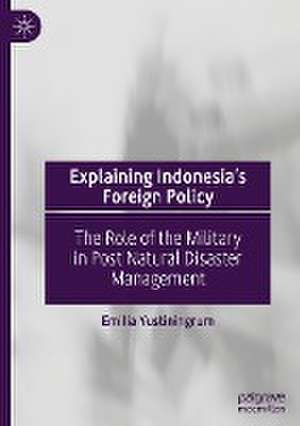Explaining Indonesia’s Foreign Policy: The Role of the Military in Post Natural Disaster Management
Autor Emilia Yustiningrumen Limba Engleză Hardback – 8 feb 2024
When the Aceh tsunami struck in late 2004, the use of foreign military assets in responding to natural disasters was not a common feature in Indonesian history—Jakarta remained reticent to engage foreign military enclaves within its own territories. This greatly affected Indonesia’s security cooperation with other countries, including Australia. Prior to the Aceh tsunami, natural disaster management was a domestic political issue. The unprecedented decision by the government of Susilo Bambang Yudhoyono to approve foreign military assistance for military operations other than war (MOOTW) in Aceh was a result of domestic and international factors.
This book addresses timely yet fundamental questions about Indonesian foreign policy decision making that led to the involvement of foreign militaries in the country’s worst-ever natural disaster. As a former colony that prized the value of non-interference, the Indonesian government had to make a difficult decision about whether to accept offers of international assistance from countries including Australia. With this, the book explores why the Indonesian government decided to approve Australian humanitarian assistance following the 2004 Aceh tsunami, and how governmental agencies managed this assistance.
Preț: 694.45 lei
Preț vechi: 816.99 lei
-15% Nou
Puncte Express: 1042
Preț estimativ în valută:
132.96€ • 136.39$ • 111.95£
132.96€ • 136.39$ • 111.95£
Carte tipărită la comandă
Livrare economică 26 februarie-12 martie
Preluare comenzi: 021 569.72.76
Specificații
ISBN-13: 9789819981540
ISBN-10: 9819981549
Pagini: 264
Ilustrații: XXI, 264 p. 1 illus.
Dimensiuni: 148 x 210 mm
Greutate: 0.49 kg
Ediția:1st ed. 2024
Editura: Springer Nature Singapore
Colecția Palgrave Macmillan
Locul publicării:Singapore, Singapore
ISBN-10: 9819981549
Pagini: 264
Ilustrații: XXI, 264 p. 1 illus.
Dimensiuni: 148 x 210 mm
Greutate: 0.49 kg
Ediția:1st ed. 2024
Editura: Springer Nature Singapore
Colecția Palgrave Macmillan
Locul publicării:Singapore, Singapore
Cuprins
Chapter 1: Foreign Military in Post Natural Disaster Management.- Chapter 2: Analytical Framework and Methodology.- Chapter 3: The Aceh Tsunami and The Australian Defence Force.- Chapter 4: Natural Disasters and Indonesian Foreign Policy Making.- Chapter 5: Institutional Arrangement.- Chapter 6: Domestic Support and Opposition.- Chapter 7: The International Environment.- Chapter 8: Policy Relevance: Executive Dominance, Military Decline and Parliamentary Assertiveness.
Notă biografică
Emilia Yustiningrum completed her PhD at Griffith University in 2021. She is a researcher at the National Research and Innovation Agency (BRIN), formerly known as the Indonesian Institute of Sciences (LIPI), Indonesia. Her research interests cover international relations, foreign policy, and natural disasters.
Textul de pe ultima copertă
This book examines Indonesia’s post-Aceh tsunami disaster management through the lens of a multifaceted foreign policy decision-making process involving a variety of bureaucratic actors. It argues that organizational structure and bargaining aspects are as important as power and interests in explaining foreign policy making in the Indonesian context.
When the Aceh tsunami struck in late 2004, the use of foreign military assets in responding to natural disasters was not a common feature in Indonesian history—Jakarta remained reticent to engage foreign military enclaves within its own territories. This greatly affected Indonesia’s security cooperation with other countries, including Australia. Prior to the Aceh tsunami, natural disaster management was a domestic political issue. The unprecedented decision by the government of Susilo Bambang Yudhoyono to approve foreign military assistance for military operations other than war (MOOTW) in Aceh was a result of domestic and international factors.
This book addresses timely yet fundamental questions about Indonesian foreign policy decision making that led to the involvement of foreign militaries in the country’s worst-ever natural disaster. As a former colony that prized the value of non-interference, the Indonesian government had to make a difficult decision about whether to accept offers of international assistance from countries including Australia. With this, the book explores why the Indonesian government decided to approve Australian humanitarian assistance following the 2004 Aceh tsunami, and how governmental agencies managed this assistance.
When the Aceh tsunami struck in late 2004, the use of foreign military assets in responding to natural disasters was not a common feature in Indonesian history—Jakarta remained reticent to engage foreign military enclaves within its own territories. This greatly affected Indonesia’s security cooperation with other countries, including Australia. Prior to the Aceh tsunami, natural disaster management was a domestic political issue. The unprecedented decision by the government of Susilo Bambang Yudhoyono to approve foreign military assistance for military operations other than war (MOOTW) in Aceh was a result of domestic and international factors.
This book addresses timely yet fundamental questions about Indonesian foreign policy decision making that led to the involvement of foreign militaries in the country’s worst-ever natural disaster. As a former colony that prized the value of non-interference, the Indonesian government had to make a difficult decision about whether to accept offers of international assistance from countries including Australia. With this, the book explores why the Indonesian government decided to approve Australian humanitarian assistance following the 2004 Aceh tsunami, and how governmental agencies managed this assistance.
Emilia Yustiningrum completed her PhD at Griffith University, Australia. She is a researcher at the National Research and Innovation Agency (BRIN), formerly known as the Indonesian Institute of Sciences (LIPI), Indonesia. Her interests are international relations, foreign policy, and natural disasters.
Caracteristici
Examines Indonesia’s disaster management in post-Aceh tsunami Addresses timely yet fundamental questions about Indonesian foreign policy decision making Argues that organizational structure and bargaining aspects are as important as power and interests
